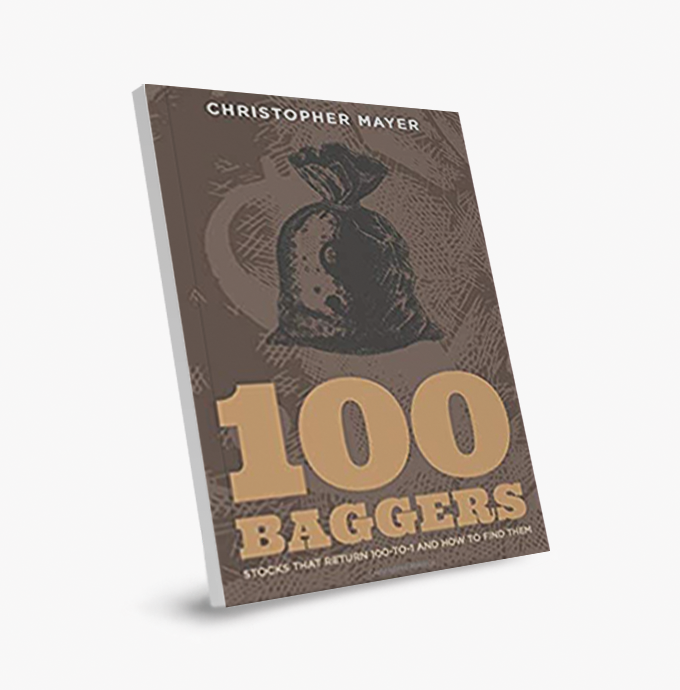


from Christopher W. Mayer
Finance
100 Baggers" delves into the art of long-term investment, highlighting strategies like the Coffee-Can Portfolio and focusing on growth stocks with high returns on capital. This book offers insights into strategic selling, understanding market trends, and the importance of patience and resilience in wealth creation. It's a guide to mastering investment for lasting professional development and innovation.
"Over the course of an investing life, stuff is going to happen—both good and bad—that no one saw coming. Instead of playing the guessing game, focus on the opportunities in front of you. And there are always, in all markets, many opportunities. Yes, always!" Christopher W Mayer, 100 Baggers
BRIEF BOOK SUMMARY
100 Baggers" by Christopher W. Mayer offers invaluable insights for investors, particularly those looking to make significant gains over a long period. The book's central premise revolves around identifying stocks that can return $100 for every $1 invested, a concept known as '100-baggers'. These extraordinary returns, Mayer argues, are not as rare as one might think, but they do require a distinct approach to investing, centered around deep research, and a long-term vision.
Mayer emphasizes the importance of patience in investment. He illustrates that significant returns often take decades to materialize, urging investors to adopt a long-term perspective. This approach is crystallized in the 'Coffee-Can Portfolio' strategy, which involves selecting high-potential stocks and holding them for an extended period, akin to storing them in a "coffee can." This strategy reduces the impulse to react to short-term market fluctuations and focuses on the eventual substantial growth of investments.
A key focus of the book is on the characteristics of companies that are likely to become 100-baggers. Mayer points out that these companies often exhibit high returns on capital, consistent growth in sales and earnings, and visionary leadership. Particularly, owner-operated companies or those led by founders often outperform others. The book also underscores the role of rigorous research in identifying these companies, advising investors to look beyond surface metrics and understand the intrinsic value and growth potential of a business.
Mayer also delves into the practical aspects of investing in potential 100-baggers. He discusses the use of the PEG (Price/Earnings to Growth) ratio for assessing a stock's valuation to its growth potential, and the importance of focusing on small-cap companies, which are more likely to yield high returns. The book cautions against frequent selling, advocating for holding onto stocks through market dips and underperformance, provided the long-term growth narrative remains intact.
In conclusion, "100 Baggers" is a guide for savvy investors, entrepreneurs, and business leaders, providing tools and methodologies for identifying and investing in high-potential stocks. It encourages a mindset shift from short-term gains to long-term wealth creation, emphasizing research, patience, and a deep understanding of business fundamentals. The insights offered in the book are not just about stock picking, but about cultivating a strategic investment approach that can lead to exponential growth over time.
WHY SHOULD YOU READ THIS BOOK? By Francisco Santolo
The book's approach to identifying stocks that can return $100 for every $1 invested offers a profound insight into strategic long-term investment. In my opinion, a good investor does not aim to generate quick profits by arrogantly predicting what will happen, nor does he despair of short-term fluctuations or downturns. Instead, he invests in understanding the deeper nuances of businesses and markets to build his portfolio. This book is particularly valuable for those who seek to cultivate a mindset of growth and wealth creation.
"100 Baggers" aligns with a strategic approach to business, where long-term vision and consistency are key. It effectively communicates the importance of patience, emotional intelligence, and resilience in investing, which are also crucial traits for entrepreneurs and business leaders.
Mayer's insights into the characteristics of potential 100-baggers are particularly valuable for understanding where to focus: companies with high returns on capital and visionary leadership. The book's practical approach, which includes using tools like the PEG ratio to evaluate investment potential, is highly interesting for learning about financial indicators and making informed decisions.
The book also offers a nuanced perspective on the role of luck and timing in investments, which is often underestimated. Understanding that even with the best strategies and research, external shocks play a significant role, is vital for a balanced approach to business, entrepreneurship, innovation, and investment. This humility in the face of market forces is a valuable lesson for all business professionals, resilience is key.
100 Baggers is valuable for investors and for those entrepreneurs or businesswomen who seek to understand how investors value high-growth companies. The truth is that by listening to CEOs and CFOs during earnings reports and closely following companies and their stocks over time, I have acquired a wealth of knowledge about business, finance, and strategy.
Francisco Santolo
RELATED BOOKS WE RECOMMEND
"The Snowball: Warren Buffett and the Business of Life" by Alice Schroeder
This biography of Warren Buffett offers an in-depth look at the life and investment strategies of one of the world's most successful investors. Buffett's long-term, value-focused approach and his ability to identify companies with significant growth potential resonate well with the themes in "100 Baggers." Schroeder’s detailed account provides a personal and professional backdrop to the investment philosophies that Mayer discusses.
"Invest Like a Guru: How to Generate Higher Returns At Reduced Risk With Value Investing" by Charlie Tian
Tian's book provides practical advice on adopting the strategies of stock market gurus. It aligns with Mayer's emphasis on long-term, growth-focused investment strategies, offering additional insights into how to apply these approaches in real-life scenarios.
"Dead Companies Walking: How a Hedge Fund Manager Finds Opportunity in Unexpected Places" by Scott Fearon
Fearon's exploration of why companies fail offers a crucial counterbalance to Mayer's focus on finding successful growth companies. Understanding the pitfalls that lead to a company's downfall is essential for investors looking to avoid these traps and focus on truly promising investments.







